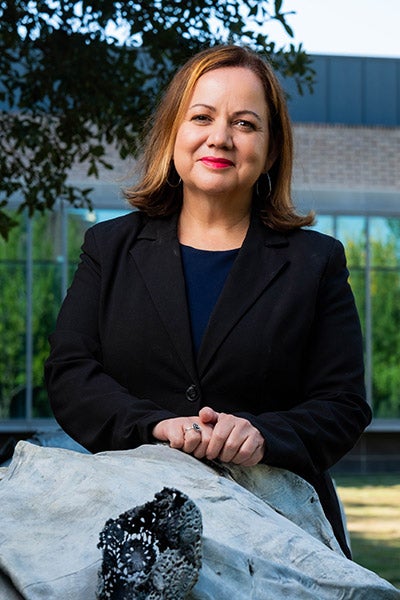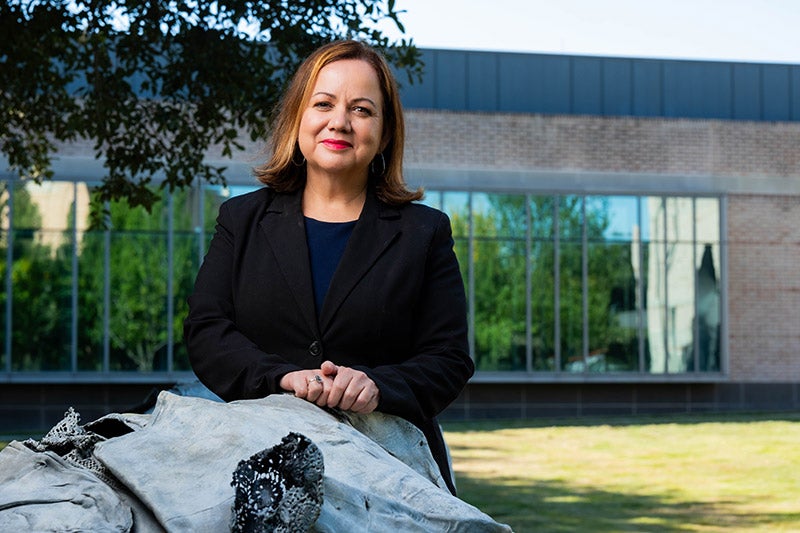Brenda Rangel grew up in South Texas in the small town of Mission with eight brothers and sisters and working-class parents who put all their efforts into helping their children attend college. Not only did all nine siblings graduate from college, but most earned postgraduate degrees.
“Even though my parents only had a middle school education, they knew the value of an education and encouraged us to pursue our dreams,” Rangel said. “My mother taught us that through education, we would have choices — and those choices would provide opportunities, thus accomplishing our goals.”
Rangel chose teaching and received three degrees: a B.A. in political science and Spanish from Sam Houston State University, an M.S. in curriculum and instruction from Houston Baptist University, and a doctorate in educational leadership and policy from the University of Texas
After working for 25 years in the public school system as an administrator, principal and bilingual teacher, she is now assistant dean of the Glasscock School of Continuing Studies at Rice University.

She directs the Rice Center for Education, which consists of several divisions: School Literacy and Culture, the Center for College Readiness, and the Summer Pre-College and Education Department. Rangel is also responsible for creating and enhancing new programs within these divisions.
“Her unique background of being a Latina allows her to understand the complexities and opportunities in urban schools and minority households,” said David Vanegas, who is pursuing a master’s in education at Rice. “It is because of those experiences and skills I believe she will fundamentally change and strengthen the Rice education program.”
The Master of Arts in Teaching is critically important to Rangel because it is designed for new and experienced teachers who want to impact the teaching profession by building their craft, sharing their knowledge and mentoring high school students. Rangel explained that many new enrollees are professionals, such as lawyers and engineers, who want to change careers and make a difference in their communities.
“We often hear from career changers regarding their desire to make a societal impact. They join our program after reflecting on their lives and see the teaching profession as a way to contribute,” she said.
Vanegas said he enrolled in the program because he “wanted to serve a cause greater than [his] ambition.” He added, “I want to serve my community by mentoring future scholars.”
The two-year program offers research-based practices and classroom teaching experience. In the first year of teacher residency, the students observe experienced classroom leaders and learn alongside their mentors, and in the third and fourth semesters, they are full-time teachers guided by a field supervisor and a campus mentor.
“Most programs will teach you the theories and pedagogies on how to become an effective teacher, but very few offer the practicum to test those theories and pedagogies out in a real classroom,” Vanegas said.
“Everyone who goes through the teaching program becomes part of their school community,” Rangel said. As a result, the program seeks to find ways to support students financially. Although the program costs about $20,000, the department provides teacher residency grants, Rice Education scholarships and financial aid.
Our goal is to find funding through our partnerships to ensure that any student who wants to become an educator can do so without the burden of debt.
— Brenda Rangel
“Our goal is to find funding through our partnerships to ensure that any student who wants to become an educator can do so without the burden of debt,” Rangel said.
Another program that Rangel likes to tout is the Center for College Readiness, which trains teachers to prepare students for the Advanced Placement test or the International Baccalaureate course.
The weeklong programs offer fall, spring and summer institutes in foreign languages, history, mathematics and science. Recently, the College Board awarded Rice the right to prepare teachers in the new Advanced Placement African American Studies course.
In its 30th anniversary, the program has attracted more than 75,000 teachers from all over the state, country and world. Rangel believes that the rigorous coursework of AP and IB prepares students to succeed in college and receive a university degree. The high-quality preparation of teachers connects an advanced academic curriculum to strategic studying techniques.
A third program that Rangel oversees is the School Literacy and Culture’s Early Literacy Leadership Academy (ELLA). This two-year extensive program brings leaders in early childhood development together to share effective practices. The program consists of monthly research-based seminars, mentored learning and practicums. Students learn the role of oral language in early literacy development, storytelling and story acting. They also learn how to incorporate research-based pedagogy.
“The presence of early literacy and social skills for our youngest scholars is crucial to their academic trajectory and success,” Rangel said.
Griselda Balbuena, a Spring Branch Independent School District teacher, said ELLA practically changed her life. “ELLA made a difference in my life by opening the doors to opportunities I never imagined I could attain,” she said.
“As an early childhood leader, I transitioned into mentoring, presenting and curriculum writing,” she added. “Who would have thought that two years of ELLA would have turned into a lifetime of learning and passion.”
In spite of growing up in a small town that offered few opportunities, Rangel proved her mother right. Education does offer choices and prepared her to teach and develop others.
“My passion is to help young teachers and leaders to support our evolving student body. It is important to guide and train our emerging educators to teach and lead effectively so our communities can thrive and move forward.”
— David D. Medina
Director
Multicultural Community Relations
Public Affairs

